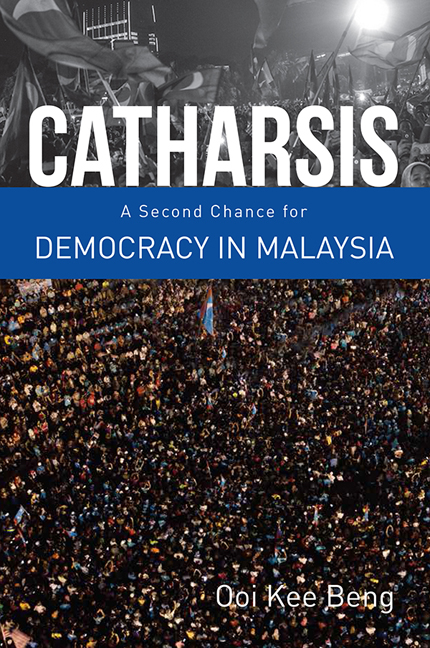Book contents
- Frontmatter
- Contents
- Foreword
- 1 Introduction – Malaysia's Future Is Redeemed
- Before Pakatan Harapan
- Before 9 May 2018
- 12 Racialising the Un-racialisable: What Is the Red Shirt Rally All About?
- 13 One Country's Merdeka Is Another's Damage Control
- 14 Malaysia – Where Politics Must Be Ethnically Inclusive and Exclusive at the Same Time
- 15 Is Malaysia at a Crossroads or in a Quagmire?
- 16 Unity Without Solidarity Sows Disunity
- 17 UMNO and Looking Back at History
- 18 Sarawak Forces Federal Opposition to Do Deep Soul-searching. But Can It?
- 19 By-elections Reveal New Malay Politics
- 20 Interview with Mahathir Mohamad: ‘People Must Be Able to Hold Their Heads Up.’
- 21 Malaysia Has to Start Re-examining Its Histories
- 22 Waves from US Probe into 1MDB May Turn into Tsunami
- 23 Seeking a New Formula to Unite Malaysia's Diversity
- 24 Time for Anwar to Accept Mahathir's Olive Branch?
- 25 Najib, Mahathir and the Timing of Malaysia's Polls
- 26 Excessive Governance Is Not Good Governance
- 27 Why Malaysia's Opposition Will Take to the Streets Again
- 28 Merdeka is About The Individual, Too
- 29 A Battle Between Malay Leaders Over Malaysia's Future
- 30 The Primacy of Political Economy in Asia
- With Mahathir at the Helm
- Beyond 9 May 2018
- About the Author
25 - Najib, Mahathir and the Timing of Malaysia's Polls
from Before 9 May 2018
Published online by Cambridge University Press: 12 February 2019
- Frontmatter
- Contents
- Foreword
- 1 Introduction – Malaysia's Future Is Redeemed
- Before Pakatan Harapan
- Before 9 May 2018
- 12 Racialising the Un-racialisable: What Is the Red Shirt Rally All About?
- 13 One Country's Merdeka Is Another's Damage Control
- 14 Malaysia – Where Politics Must Be Ethnically Inclusive and Exclusive at the Same Time
- 15 Is Malaysia at a Crossroads or in a Quagmire?
- 16 Unity Without Solidarity Sows Disunity
- 17 UMNO and Looking Back at History
- 18 Sarawak Forces Federal Opposition to Do Deep Soul-searching. But Can It?
- 19 By-elections Reveal New Malay Politics
- 20 Interview with Mahathir Mohamad: ‘People Must Be Able to Hold Their Heads Up.’
- 21 Malaysia Has to Start Re-examining Its Histories
- 22 Waves from US Probe into 1MDB May Turn into Tsunami
- 23 Seeking a New Formula to Unite Malaysia's Diversity
- 24 Time for Anwar to Accept Mahathir's Olive Branch?
- 25 Najib, Mahathir and the Timing of Malaysia's Polls
- 26 Excessive Governance Is Not Good Governance
- 27 Why Malaysia's Opposition Will Take to the Streets Again
- 28 Merdeka is About The Individual, Too
- 29 A Battle Between Malay Leaders Over Malaysia's Future
- 30 The Primacy of Political Economy in Asia
- With Mahathir at the Helm
- Beyond 9 May 2018
- About the Author
Summary
According to its Constitution, Malaysia has to hold its next general election by 24 August 2018. At the time of writing, that is still almost two years away. And yet, rumours of early elections persist, both at the state and federal levels.
This needs some explaining, given how Prime Minister Najib Razak waited until almost the last minute to go to the polls back in 2013.
The exercise to delineate constituency boundaries now being concluded heightens speculation that early polls are coming. Having lost its two-thirds majority since 2008, the ruling Barisan Nasional (BN) has not been able to increase the number of parliamentary constituencies; it is now able only to realign the existing ones or rename them. And that, it is doing.
That in itself is a substantive exercise of power especially with the independence of the Election Commission that is in charge of the delineation being in serious doubt.
The major argument for those predicting that elections will be held by mid-2017 is that the opposition is in a confused state, if not in disarray. And so, before they can get their act together, the chances of Datuk Seri Najib holding his ground and maintaining at least the same voter support that he had in 2013 are good.
By hook or by crook, his administration has survived the many aspects of the 1Malaysia Development Berhad (1MDB) scandal, at least for now. By sacking key dissidents from UMNO, especially his former deputy Tan Sri Muhyiddin Yassin, he has consolidated his hold on the leadership of the party.
Victory in the Sarawak state election held in May and in two recent by-elections in June, one in Perak state which it marginally controls and the other in opposition-controlled Selangor state, also brought some comfort for the BN coalition and showed that the Malay ground remains encouragingly loyal. Also, the anti-BN votes in the byelections were split down the middle between Parti Islam SeMalaysia (PAS) and its recent splinter party, Parti Amanah Negara.
Having this indication that the Malay opposition to UMNO is badly split and convinced that the PAS leadership is now more willing than ever to negotiate with it, BN has all the more reason to dissolve Parliament earlier rather than later.
- Type
- Chapter
- Information
- CatharsisA Second Chance for Democracy in Malaysia, pp. 88 - 91Publisher: ISEAS–Yusof Ishak InstitutePrint publication year: 2018

